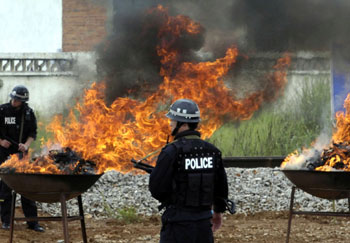| Tools: Save | Print | E-mail | Most Read |
| China Questions and Answers |
| Adjust font size: |
Q: It is reported that a majority of drugs produced in the Golden Triangle are smuggled into China. What is your response to these reports? What is the status of China's anti-drug campaign, and what efforts are underway to strengthen cooperation with neighboring countries in cracking down on drug-related crimes? A: Currently, affected by the international flow of narcotics and aggravated by domestic drug-related factors, the war on drugs remains a grim job in China. This is manifested in the multiple sources of narcotics, diversified forms of drug abuse and tight chain of drug production, sale and abuse, especially in southeast China, where the clandestine manufacturing and sale of crystal methamphetamine hydrochloride, known locally as "ice," and MDMA, or amphetamine tablets, are rampant. These drug manufacturers and pushers are everywhere and keep shifting their operations across the region. At the same time, international drug traffickers, with multiple sources of narcotics, keep penetrating the Chinese territory through various smuggling routes. The Golden Triangle, one of the world's leading sources of opium and heroin, poses the greatest threat to China. The notorious triangle produces 70 to 80 tons of heroin annually, of which 80 percent is smuggled through the border of Myanmar and China into the inland Chinese market, by way of vehicle, body cavity concealment, mail delivery and other methods. In 2003, China cracked 156 drug-related cases, seizing 4.13 tons of drugs, of which all heroin was from the Golden Triangle. Afghanistan, which borders China on the northwest and produced more than 4,000 tons of opium in 2004, poses even greater harm and potential threat. As well, new types of narcotics keep penetrating China's southeast coast. The anti-drug situation in the country remains grim. The spread of drugs jeopardizes not only the mental and physical health of the people, but also the stability of the Chinese economy, politics and society. The drug problem, associated with international terrorism and separatism illegal organizations, corruption, money laundering and other crimes, seriously endangers the security and social stability of China. In 2004, the Chinese Government launched a nationwide anti-drug campaign, cracking 98,000 drug-related cases and arresting 66,900 suspects, an increase of 4.4 percent and 5.5 percent respectively over the precious year. Seized during the campaign were 10.8 tons of heroin, up 13.6 percent over 2003, more than 3 million MDMA tablets, an increase of 8 percent, 2.7 tons of crystal methamphetamine, down 52.9 percent, and 160 tons of chemicals used to manufacture drugs, up 119.8 percent. Due to these anti-drug efforts, the drug supply-demand balance has been disturbed, and the rising trend of drug-related crimes has been brought under control. In order to effectively check the threats to China from the Golden Triangle, sub-East Asia and elsewhere, the Chinese Government has devoted itself to regional and bilateral anti-drug cooperation with countries surrounding the triangle, and established in succession three anti-drug cooperative mechanisms. One involves six countries—China, Cambodia, Laos, Myanmar, Thailand and Viet Nam—and one party, the Bangkok-based Regional Center for East Asia and the Pacific under the United Nations Office on Drugs and Crime. Another cooperative mechanism joins the member countries of the Association of Southeast Asian Nations, and the final mechanism links China, Laos, Myanmar, Thailand and India. Under these frameworks, China has conducted inter-country cooperation in the form of information exchanges, collaborative investigations, joint anti-drug actions, and the training of anti-narcotics squads. As well, China is expanding bilateral cooperation with Myanmar, Thailand, the Philippines, Japan, the Republic of Korea, Australia and some European and North American countries regarding anti-drug information and investigations, cracking down on transnational drug-trafficking and promoting gradual solutions to the drug problem haunting neighboring countries. At the same time, China is further strengthening communication and cooperation with international anti-drug organizations, fulfilling its obligations under international conventions and promoting an active and pragmatic approach for cooperation on the drug issue. Currently, China is tightening its legal system by speeding up the legislation of an anti-narcotics law, and promoting administrative regulations on chemicals used to manufacture drugs and on stupefying and psychiatric narcotics.
|
| Tools: Save | Print | E-mail | Most Read |
 |
| Related Stories |
|
Product Directory China Search |
Country Search Hot Buys |
